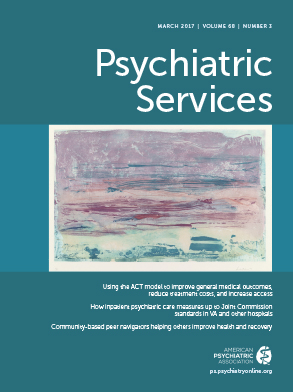In their systematic review in this issue, Vanderlip and colleagues review the literature on the effect of assertive community treatment (ACT) on general medical service utilization, medical outcomes, and cost. The investigators find that although some studies showed increased utilization of primary care, very few have rigorously examined general medical outcomes for this population. The investigators recognized that ACT could be a convenient services platform to integrate primary and mental health care. With ACT models already in place, making minor adjustments to them could have an immediate impact for this vulnerable population. In addition, these models are reserved for the most impaired people with severe mental illness, who are likely to have poor health-related behaviors.
Although ACT teams could be used to provide more holistic care, we must keep in mind that these teams serve only a small segment of the population with severe mental illness. Because almost half of people with severe mental illness regularly access community mental health clinics, these clinics are the de facto “health home” for at least 3.5 million people with severe mental illness across the United States. We need to develop evidence-based solutions that work for all of these patients.
Despite several excellent NIH-funded studies, the mental health services research community has a poor track record of providing scientific evidence to guide administrators in restructuring our public mental health care system to provide better general medical care for people with severe mental illness. Although over 80 randomized controlled trials support the collaborative care model to improve screening and treatment of depression, two systematic reviews failed to identify sufficient evidence to recommend any approach to provide health care for people with severe mental illness. Even with some promising primary care and behavioral health care integration pilot programs funded by the Substance Abuse and Mental Health Services Administration, we do not have data for models that are fiscally sustainable.
The onus is on the public mental health care system to re-envision provision of care by using the evidence available so far and to leverage existing internal resources to provide care. This could be done in three steps.
First, Dr. Ben Druss and others have been talking about the challenges with electronic, cultural, geographic, and fiscal separation between primary care and behavioral health care for over 20 years. While it is challenging to overcome all these silos, community psychiatrists at the very least must be the champions (or squeaky wheels) to demand electronic integration with our colleagues in primary care. Psychiatrists need to know—at minimum—what lab tests have, or have not, been ordered and what medications are being prescribed within their own public health care system. It is shameful that such a disconnection exists in the midst of this technological era.
Second, community mental health clinics must begin to use a population approach to improve metabolic screening. Collaborative care has taught us that registries help improve screening for depression, and they would undoubtedly do the same in community mental health settings.
Finally, if and when metabolic abnormalities are identified, why shouldn’t we—in psychiatry—be able to get primary care consultation to help initiate treatment of, for example, new-onset dyslipidemia, prediabetes, or hypertension? There already is a doctor in the house. This rationale has parallels to the logic used to treat depression in primary care: cardiovascular disease (CVD) risk factors (such as diabetes, hypertension, dyslipidemia, and smoking) are common among people with severe mental illness, people with severe mental illness receive care in community mental health clinics, treatment guidelines for CVD risk factors exist, and untreated CVD risk factors are costly to society. Technology could be harnessed to provide primary care consultation and overcome financial and logistical barriers that are common in community mental health settings. We need to fight to obtain this training and primary care consultation support. In fact, Drs. Vanderlip, Raney, and Druss proposed a framework for extending psychiatrists’ role (American Journal of Psychiatry 173:658–663).
It is our role as community psychiatrists to fight for the health care that all people with severe mental illness deserve. In this new political era, with the Affordable Care Act at risk, community psychiatry may have even more limited resources. We need to use existing evidence from multiple sources to help determine how to spend our resources wisely to provide the best possible medical care for people with severe mental illness. We can do this together through electronic integration, population health approaches, and expansion of our scope of practice to include basic primary preventive health care.

